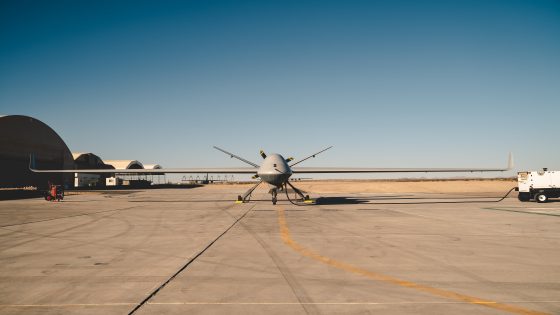LONDON â The U.K. has been discreetly building a global MQ-9B operators club in Europe open to NATO and non-NATO members operating or interested in acquiring the long-range drone that will be granted training access at an in-country flight facility.
On July 20, the Royal Air Force announced the creation of a new MQ-9 International Cooperation Support Partnership, or MIC SP, formed under the NATO Support and Procurement Agency, or NSPA, that builds on a previous similar U.K.-led project.
âThe MQ-9B International Cooperative Program was established in 2019 and the work to determine the best way forward to enhance cooperation was done in 2023/24 with the conclusion that NSPA and a MIC SP delivered the best path,â an RAF spokesman for the program told Defense News.
The drone program is growing rapidly, the spokesman said, as it initially included six nations and now comprises ten.
âIn April 2023, MICP nations were Belgium and the U.K. as participants (to the memorandum of understanding); with Canada, Denmark, Germany, Greece, Lithuania, and Norway as observers â since then, we have added Qatar and Sweden as observers,â he said.
The representative added very few obligations come with joining the program under observer status and countries âonly need to be âinterestedâ in potentially procuring the MQ-9B.â
The ambitions laid out by the RAF for the usersâ club include developing and testing a framework to increase cooperation amongst member nations, enhance interoperability and facilitate joint training. Countries can join either as participants, associated states or in an observer capacity.
RELATED
Affiliates will further have the opportunity to benefit from the air and ground crew training provided by the U.K. through the NATO Flight Training Europe Remotely Piloted Aircraft Systemsâ facility at the RAF Waddington base.
The station, located in Lincolnshire, is known as the hub of U.K. reconnaissance and surveillance, as well as the forceâs main operating site for airborne intelligence aircraft and systems.
The MQ-9B is designed to be airborne for over 40 hours and differs from the MQ-9A variant in that it is able to be certified to operate in civilian airspace, according to its manufacturer, General Atomics Aeronautical Systems, or GA-ASI.
The RAF is one of the main operators of this aircraft, which it has named the Protector. Although some smaller countries, such as the Nordics, have expressed a strong interest in acquiring these drones, the hefty price tag attached to them has been somewhat of a trade-off theyâve acknowledged.
In a recent interview with Defense News, Maj. Gen. Jonas Wikman, chief of the Swedish Air Force, said that Sweden had not yet decided to buy an asset such as the MQ-9 Reaper âmostly because it does not fit our size or budget.â
An advantage the new MIC SP framework would provide is enabling multinational contracting with GA-ASI or the U.S. government to achieve benefits through âsharing of costs,â among member nations.
Having all three Nordic nations â Sweden, Norway and Denmark â onboard as observers is a good signal, the spokesman said, that they eventually may opt to buy this drone, which would be a force multiplier for the allianceâs intelligence assets in this region.
âIt is hoped that all Nordic nations might acquire the MQ-9B to enhance cooperation in the Northern Atlantic and Polar regions, particularly in the maritime domain and to partner with nationsâ maritime patrol aircraft, such as the P8,â he said.
Norway announced plans in April to acquire long-range drones to bolster its maritime surveillance, which local media reported would likely be a choice between Northrop Grummanâs MQ-4C Triton platform and the MQ-9B.
RELATED
:quality(70)/cloudfront-us-east-1.images.arcpublishing.com/archetype/H2HLKVDDVNBJVJDSRXM22XWFVE.jpg)
In an opinion piece published in Aftenposter, Norwayâs largest newspaper, a retired Army major argued General Atomicsâ âmore affordableâ offering and longer endurance were key factors for a state with scarce resources like Oslo.
In an emailed statement to Defense News, a senior advisor to the Norwegian Minister of Defense said a prerequisite for establishing a long-range drone capability is âthat it must be carried out as part of a multinational collaboration â which can involve training, operation and development â with close allies.â
The officer added no decision has yet been taken on who this cooperation should take place with.
Elisabeth Gosselin-Malo is a Europe correspondent for Defense News. She covers a wide range of topics related to military procurement and international security, and specializes in reporting on the aviation sector. She is based in Milan, Italy.
Source Agencies



